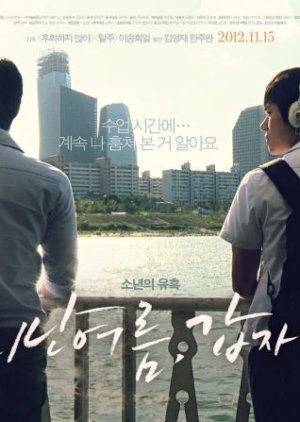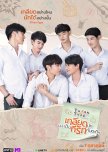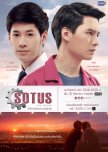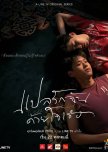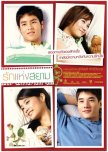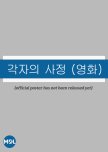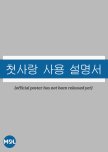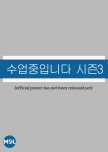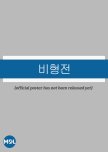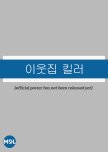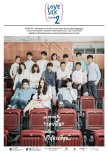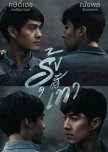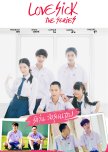
rápida mas interessante
Interessante a dinâmica que é retratada aqui, essa noção de um sentimento que não deveria existir da maneira que ele existe então você tenta lutar contra ele até perceber que é em vão. Eu senti que talvez esse apego do sang woo ia muito além de um apego amoroso mas um conforto em ter uma outra pessoa como ele é um ambiente não amigável. Muito bonito a transição da recusa-aceita.cada vez que passa estou me apegando mais as obras do leesong heeil. berço de tanto talento e figura paterna total!!
Esta resenha foi útil para você?

ACTING/CAST: Decent. There isn't really anybody else besides watching these two interact.
MUSIC: Unmemorable.
REWATCH VALUE: If I'm bored one day, maybe.
OVERALL: I felt a lot of pity for the student throughout the show but the ending is satisfying.
Esta resenha foi útil para você?

good!
I felt bad to discover this movie almost 10 years later. The story is pretty good. The actors are amazing. I think they do a great job, the last scene was... speechless.... The beginning is good but It's not so easy to go inside and understand everything, what is understandable, It's because they head are such a mess, but this movie is so good, It's the type of perfect movie to watch in the sunset, It's short and complete, I really hope 10 years later they do a second movie, I know they deserve a more long movie and I'd love to watch their story with the guy in college or even working.Esta resenha foi útil para você?

Repulsion and attraction
Repulsion and attraction ... that's how I would characterize this "long" short film. However, forcing favor in such a way was too much for me, and I did not celebrate the very end in my mind as much as the other viewers. But it was played very solidly, above all I appreciated the character of the teacher, who found herself in a rather unsolvable situation. The second cheeky character of the student was also portrayed very well, but I didn't trust the "minor" so much when in reality he was ten years older. An above-average film for its time.Esta resenha foi útil para você?
Interesting
I find that a lot of the older Korean BLs are a little tragic/sad.I watched this a few years ago, and I was left unsatisfied with the short. It was interesting and touched on some very sensitive topics. But I enjoyed the acting and the actors. I think they did such a fantastic job. In particular I loved Han Joo Wan. It was awful to hear that he "retired" due to his drug scandal. IDK why because there are so many idols and actors who are back despite having bigger scandals with drugs. He is an incredible actor. I do hope he is able to come back. He was really the stand out factor of this short.
Esta resenha foi útil para você?

Esta resenha pode conter spoilers
Taboo or To be
Gay teen goes to a bar, mutual attraction occurs, later it turns out to be his homeroom teacher. No hook-up was implied, just eye contact. In the light of day, teacher Hoon sets boundaries but over a year, teen Woo sees every act of sparce kindness as Hoon's continued attraction for him. Woo stalks him. Hoon's job is to interview the parents at home of all the students. Finally, Woo forces the situation to come to a head by physically inserting himself in Hoon's care and doesn't leave. Woo wants an admission from Hoon. Does he remember their previous encounter? Will he admit that he is attracted to him? Will he give in and let Woo into his life? I should mention here, Hoon is 35 and his pursuer Woo is 18.Before 2020, the legal age of consent in South Korea was 13. The film was made in 2012.
Hmmm, gray area or no?
Woo doesn't take no for an answer. He relentlessly pursues Hoon, blackmailing him into spending time with him with pictures he took of Hoon in the gay bar. Hoon is searching for another teaching position to escape as he recognizes that Woo will not give up. He knows that Woo is forbidden fruit. Woo knows himself. He is gay and he wants him. He understands the position well as his mother knows his orientation. Hoon viciously rebuffs him, and Woo hurt by his words, leaves the car in anger and cries. Finally, Hoon is free. He looks down, finds Woo's forgotten headset and carries it home. He sees Woo enter before him and on his steps he waits.
Gray area:
Though legal, what can an 18 year old teen bring to the table?
Should Hoon resist further as Woo is still in school?
Can 18 form a stable relationship?
2012 gay relationships were still no fully accepted, what would they endure as a couple, being gay, age difference and social status?
If Hoon gives in, how will his job be affected?
The film brings these thoughts to mind and only answers one. You will have to watch the entire film to get it. The actors did a commendable job with their roles. Hoon's frustration with himself and Woo is believable. Woo's dogmatic focused attitude towards the situation is dealt with an 18 year old fervor. I will recommend this film for the questions posed and the actors themselves. Though I liked it, more could have been done. Rewatch - maybe not. In 2024, this comes across more like a period piece from 2012.
Esta resenha foi útil para você?

Taboo and controversial topics in a piece of goldsmithing that every lover of good cinema should see
The Korean director Leesong Hee-il writes and directs 'Suddenly Last Summer' ('Jinanyeoreum, gapjagi'), from 2012, a 37-minute medium-length film, second part of the trilogy known as '' One Night and Two Days' (백야) that include the feature film 'Baekya' ('White Night') and the short film 'Namjjokeuro Ganda' ('Going South'), three unconnected stories that began as shorts but later expanded, in the case of the first, to a 75-minute film.His vast work, like a piece of goldsmithing, armed with the finest craftsmanship, shows a filmmaker always attentive to the details, to the subtle articulations of the adventures, with which he won the applause of critics and spectators who, even after more than one decade since its release, they still look for in it the keys to unusual, totally original cinematography, which make Leesong Hee-il one of the most distinguished exponents of Korean auteur cinema in general, and gay-themed cinema in particular. both from his country and, I would dare to say, from all of Asia and much of the world.
Without forcing anything, the director of 'Suddenly Last Summer' plays with reality, stretches it as moldable material, and we end up accepting, without questioning, his invitation to accompany the protagonists on a journey about their sexuality, their relationship and their place. in society. The viewer must be attentive, since the medium-length film begins right in the middle of the story, so the beginning may seem confusing to some.
In that art of telling small things, small memories, small pleasures, small sensations..., which are not so much because, ultimately, together rejoicing, they give meaning to life itself, Leesong Hee-il, considered "one of the most interesting contemporary gay Asian directors", is a skilled filmmaker capable of captivating the most diverse audiences with the power of words and images, involving the audience, in a charming way, in his films, which are all about his favorite subject , gay stories in one form or another.
Leesong Hee-il once again touches on taboo and controversial topics in any modern society, such as homosexuality, the complexity of human relationships, the problematic situation of one lover who is a minor and the other an adult, or the teacher-student role. , and the feelings between people, which on many occasions can be inappropriate, immoral or even prohibited. However, in its subconscious development, it is not something for which individuals can be directly condemned, but those feelings must be acted upon when they are negative.
Another of the values of 'Suddenly Last Summer' and the other two films that make up the trilogy is that its director places the protagonists at some intermediate point in the story, that is, their characters have begun to realize what what they feel, and now they must decide how to act. In the most difficult moment for those involved, when some will triumph while others will falter, it is the ideal moment for Leesong Hee-il to put on the camera lens and begin to tell the story, achieving, through his raw honesty, commendable and unforgettable stories. .
In the medium-length film, its director once again exposes a constant dichotomy in the relationships of his protagonists: one of his characters hides or completely denies his homosexuality, and the other is not afraid to recognize it and even enjoys shouting to the world about his gay status.
In just 37 minutes, the medium-length film raises several controversial points. It is not only the sexuality of the characters that focuses the attention of the audiovisual. Kyung-hoon hides his sexuality from everyone around him, especially the managers and teachers and students at the school where he works. Keeping his homosexuality a secret, his sexual preferences are discovered by Sang-woo, a student of his, when they both meet in a gay bar some time ago.
In a kind of obsession with his teacher, Sang-woo threatens him to reveal everything if he does not agree to his demands, and shows him some photographs captured clandestinely during the meeting held by the two at the gay club.
Fearing that he will lose his job, Kyung-Hoo agrees to spend the day with him. However, the tension between the characters doesn't seem to be related only to Sang-woo's blackmail tactics. While it is evident that Sang-woo is not motivated by a sexual impulse, since he loves his teacher, the entire film suggests that the teacher has feelings for his student.
Sincere about his sexual orientation and love for his teacher, he will claim that he had revealed to his mother that he liked boys, as well as his love for an older man, but Kyung-Hoo's reactions are ambiguous and not transparent.
There is an uncomfortable polarity within the two characters. Due to his youth, Sang-woo is innocent and love and the freedom to be happy lead him to lose himself in a delirious frenzy that drives him to shout, excited, at the fish from the boat, or to act spontaneously and make Kyung-woo listen. Hoon his favorite music after placing the headphones over his ears. He feels transported to another world in which there is no control from society or discriminatory laws and family censorship and disapproval of their children's homosexuality.
The student believes he is invulnerable to what people will say, precisely in a country as conservative as Korea, with strong patriarchal and heteronormative traditions, where homosexuals have difficulty fitting into society and even in the 21st century, sexual diversity continues to be seen as a perversion and considered taboo. But despite his plenitude, Sang-woo is also immature and seemingly unaware of the implications of what he asks of his master.
This one, for his part, is wiser thanks to his age and experience. Kyuung-Hoon is caught between desire and responsibility, between longing and ethics, between good and evil. He is aware that a relationship of this type is not an option, but the hopelessness and unhappiness that surrounds him is evident. His face reveals deep loneliness. Drinking until you get drunk shows that you have found an escape from your sadness in alcohol. He understands that a romance like the one Sang-woo asks for, and he would like to reciprocate, would not have a good result for him. That's why you make the decision to not just deny your feelings to the person you like. She must hurt him again and again with the intention of taking him away from her forever. But the boy persists in his desire to maintain a loving relationship, not just a sexual one, with the teacher. This dilemma that Hyung-Hoon is struggling with causes him great anguish and regret. Sang-woo will not be able to understand why this man who is not afraid to give him furtive glances with a clear sexual connotation in the middle of the class, surrounded by other students, rejects him. He doesn't understand why that person with whom he spent pleasant moments in a gay club and who, like him, doesn't have a boyfriend that prevents him from formalizing a relationship, seems elusive to him.
The essence of 'Suddenly Last Summer' also lies in the fact that Sang-woo could be precisely the kind of person that Kyung-hoon needs in his life, just as Won-gyu himself needs Tae-jun in 'White Night'.
Although the fact that one is a minor and the other an adult, as well as the teacher/student relationship are socially and ethically problematic, the first problem would be irrelevant (at least if the parties involved considered it so) and would have a solution in a short term, taking into account that Sang-woo has less than twelve months left to reach 19 years of age, and with this, the legal age of sexual consent in South Korea. Leesong Hee-il voluntarily introduces this problem to play subtly and skillfully with the viewer by addressing such a complex issue, while pointing out that it can be overcome. No matter how difficult or incomprehensible their reality may be for others, the terrain where the two protagonists move is not perpetual: within a short time the young man would reach the age of adulthood and with this the hope for what each of them currently wants, but they can't specify.
Regarding his roles as a teacher-student, this problem also has an immediate solution, as we know that, through a phone call to a friend, Kyung-Hoon is desperately trying to find a job at another school.
Within the trilogy, 'Suddenly Last Summer' is the most successful film among the three. Its value also lies in the deeply uncomfortable and highly problematic questions it raises about homosexual relationships and society.
But its reach goes much further. Unlike another 'No Regret' (2006), another film by Leesong Hee-il, the focus of the medium-length film, as well as the other segments of 'One Night and Two Days', focuses exclusively on the characters' feelings, using simple narratives and many fewer twists than Leesong Hee-il's first feature film.
Note: The reviews of the remaining pieces of the trilogy, in MDL, can be found on the page dedicated by the virtual platform to each of them.
Esta resenha foi útil para você?

